
![]()
Search the Journey to Forever website – click HERE
|
Journey to Forever: Make a donation |
Navigation
Contact usTo Keith Addison Handmade Projects |
Water-powered water pumps
Hydraulic ram water pumps use downhill water pressure to pump water much higher than it started, with no other power needed. A 20ft fall is enough to push water 150 feet above the source or more. Or as little as a 2ft fall between the water source and the pump at a flow rate of 1 to 3 gallons per minute is enough to pump water 20ft higher than the source -- as much as 4,000 gallons a day, depending on the model.
No modern magic this -- ram pumps were invented more than 300 years ago. A more recent variation is the High Lifter pump, which uses different principles to do the same thing. Ram pumps are noisy, high lifters are silent and can work with less water, but the water has to be clean and grit free, while the ram pump is not so fussy.
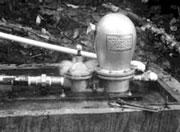
Folk hydraulic ram pump
These pumps can be expensive. Home Power magazine has had several good articles on the pumps, including designs and instructions for a cheap ram pump you can build yourself using off-the-shelf materials and a recycled fire-extinguisher. See: Hydraulic Ram Pump -- adapted from "A Manual for Constructing and Operating a Hydraulic Ram Pump" by Kurt Janke & Louise Finger, "Homebrew", Home Power #41, June / July 1994. Digital back issues can be bought online:
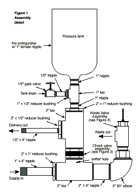
Build your own ram pump
http://www.homepower.com/
High Lifter pump maker Alternative Energy Engineering is now part of solar electric company Applied Power Corporation.
http://www.solarelectric.com/
More information on the High Lifter Pump
http://www.solarelectric.com/products/level3_179.htm
More information about High Lifter pumps from supplier Mark Snyder Electric -- Application & Installation, How High Lifters Work, Question & Answer, Not a Ram Pump (the differences). Also sells ram pumps.
http://www.marksnyderelectric.com/catalog/waterpoweredpumps.html
Fleming Hydro-Ram pumps are powerful, lightweight, practically maintenance-free, and cheaper. From The Ram Company:
http://www.theramcompany.com/
 The Bamford "Hi-Ram Pump" is a simple, low-cost, self-powered water pump using new patented technology. The principle is similar to conventional ram pumps, but its construction and characteristics are different. The heart of the pump is a stainless steel adjustment tube, and a free-floating high-impact plastic ball. It is quickly adjusted using alternative tubes, and the plastic ball gives quiet operation. While much higher outlet pressures are possible, the 25 mm (1 inch) pump can lift about 1500 litres of water daily to a height of 20 metres, using 2 to 3 metres drive head and 20 litres a minute inlet flow. The pump will operate when totally underwater. It can be made to supply compressed air or to provide a direct mechanical output to drive other devices, and can also act as a suction pump. Made with an eye to the needs of developing countries. Priced from about US$125.
The Bamford "Hi-Ram Pump" is a simple, low-cost, self-powered water pump using new patented technology. The principle is similar to conventional ram pumps, but its construction and characteristics are different. The heart of the pump is a stainless steel adjustment tube, and a free-floating high-impact plastic ball. It is quickly adjusted using alternative tubes, and the plastic ball gives quiet operation. While much higher outlet pressures are possible, the 25 mm (1 inch) pump can lift about 1500 litres of water daily to a height of 20 metres, using 2 to 3 metres drive head and 20 litres a minute inlet flow. The pump will operate when totally underwater. It can be made to supply compressed air or to provide a direct mechanical output to drive other devices, and can also act as a suction pump. Made with an eye to the needs of developing countries. Priced from about US$125.
http://www.bamford.com.au/rampump/
Hydraulic Rams -- Computer Simulation and Optimum Design
Although the hydraulic ram pump has been around for roughly 200 years, its design has been largely left to trial and error. Here is a computer-aided method for improving performance. Y.C. Chiang, Ali A. Seirig, Mechanical Engineering Department, University of Wisconsin, Madison, Wis.
-- From Computers in Mechanical Engineering, January 1985 (with thanks to Kirk McLoren)
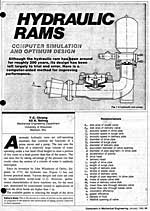
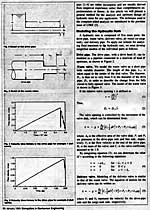
Page 2
Bigger image
Page 1
Bigger image


Page 3
Bigger image
Page 4
Bigger image
Good overview of ram pumps and their uses and restrictions from the Working Group On Development Techniques (WOT) in Holland (also rope pumps, windmills):
http://www.wot.utwente.nl/documents/articles/rampumps.html
Dutch engineer Gert Breur's ram pumps are simpler, and they not only pump, they can also suck water up from a low-lying area into a stream. Breur has also developed a small ram pump, easy to assemble, using standard "garden" materials except for some pressure tube. Materials list, numbered pictures and "exploded-view" photos show you how.
http://www.wot.utwente.nl/documents/articles/breurram/index.html
More about Gert Breur's water-powered suction ram pumps, including Spanish text; also rope-pump and more:
http://www.geocities.com/ResearchTriangle/System/7014/index.html
 Updated ram design from Gravi-Chek -- The Gravi-Chek pump is the newest technology available in the ram pump industry. The Gravi-Chek pumps have been tested by the Center for Irrigation Technology at the California Agricultural Technology Institute. There are three models available, providing water at rates from 20 to 16,000 gallons per day, depending on the installation
Updated ram design from Gravi-Chek -- The Gravi-Chek pump is the newest technology available in the ram pump industry. The Gravi-Chek pumps have been tested by the Center for Irrigation Technology at the California Agricultural Technology Institute. There are three models available, providing water at rates from 20 to 16,000 gallons per day, depending on the installation
http://www.gravi-chek.com/
Hydraulic ram pumps -- 6-page Technical Brief, Practical Action (Intermediate Technology Development Group, ITDG), Acrobat file, 190 K
http://www.itdg.org/html/technical_enquiries/docs/hydraulic_ram_pumps.pdf
Overview of ram pumps (and hand pumps) with some useful diagrams, from the (ahem) "Sourcebook of Alternative Technologies for Freshwater Augmentation in Small Island Developing States/Part B - Technology Profile/2. Technologies Applicable To Very Small, Low Coral Islands/ 2.1 Freshwater Augmentation Technologies/2.1.3 Pumps":
http://www.unep.or.jp/ietc/Publications/TechPublications/
TechPub-8d/pumps.asp
Ram Pump System Design Notes from the Development Technology Unit, School of Engineering, University of Warwick, UK: Online papers -- Introduction to hydraulic ram pumps, how ram pumps work, instructions for use and manufacture, designs, plans and drawings; also low-cost handpumps.
http://www.eng.warwick.ac.uk/DTU/lift/index.html
Another ram pump overview, more diagrams, equations, tables:
http://www2.ncsu.edu/eos/service/bae/www/programs/
extension/publicat/wqwm/ebae161_92.html
Lifewater Canada -- Hydraulic ram pumps and Sling Pumps. Lots of great information at this site.
http://www.lifewater.ca/ram_pump.htm
See also Handpumps Resources -- Handpumps and water well drilling training for safe drinking water:
http://www.lifewater.ca/
Designing a Hydraulic Ram Pump -- US AID Water for the World Technical Notes
http://www.lifewater.org/wfw/rws4/rws4d5.htm
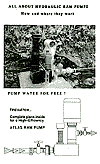 "All About Hydraulic Ram Pumps -- How and Where They Work", Don R. Wilson, 1994 (updated), Atlas Pubns, ISBN 0963152629 -- This book explains in simple terms and with illustrations how the ram pump works, where it can be set up, and how to keep it going. The second section of the book gives step-by-step plans for building a fully operational Atlas ram pump from readily available plumbing fittings that requires NO welding, drilling, tapping or special tools. The final chapter shows how to build an inexpensive ferro-cement water storage unit with up to 15,000 gallon capacity. Buy from Amazon.com: All About Hydraulic Ram Pumps
"All About Hydraulic Ram Pumps -- How and Where They Work", Don R. Wilson, 1994 (updated), Atlas Pubns, ISBN 0963152629 -- This book explains in simple terms and with illustrations how the ram pump works, where it can be set up, and how to keep it going. The second section of the book gives step-by-step plans for building a fully operational Atlas ram pump from readily available plumbing fittings that requires NO welding, drilling, tapping or special tools. The final chapter shows how to build an inexpensive ferro-cement water storage unit with up to 15,000 gallon capacity. Buy from Amazon.com: All About Hydraulic Ram Pumps
 Rife Hydraulic Engine Mfg. Co. Inc. has specialized in pumping water without electricity or fuel for over 117 years -- one of the original Water Ram manufacturers and the oldest. Manufacture 19 different models of ram pumps, pumping up to 500 ft vertically and producing up to 350,000 gal/day. Rife also manufactures the Slingpump, which works on the flow of a stream, creek or river and can lift water up to 82 ft vertically and up to one mile away, 24 hours a day with no maintenance.
Rife Hydraulic Engine Mfg. Co. Inc. has specialized in pumping water without electricity or fuel for over 117 years -- one of the original Water Ram manufacturers and the oldest. Manufacture 19 different models of ram pumps, pumping up to 500 ft vertically and producing up to 350,000 gal/day. Rife also manufactures the Slingpump, which works on the flow of a stream, creek or river and can lift water up to 82 ft vertically and up to one mile away, 24 hours a day with no maintenance.
http://www.riferam.com/
Needed by African farmers: simple water pumps -- Finding sufficient water for irrigation is one of the major challenges facing farmers in sub-Saharan Africa, where only 4% of arable land is irrigated, severely constraining agricultural productivity in a region where an estimated one third of the population is chronically undernourished. Locally produced low-cost treadle pumps instead could make an important difference and could boost food security in the region significantly, says a new report, "Treadle pumps for irrigation in Africa". Treadle pumps make it easier for farmers to retrieve water for their fields or vegetable gardens, and they are cheap and easy to handle. If pumps are produced locally, they can also create jobs and income.Many African farmers are still irrigating very small plots of land using bucket-lifting technologies, which are slow, cumbersome and labour intensive. Treadle pumps are far more efficient and user-friendly. They can be used in a comfortable way, the farmer stands on the treadles, pressing the pistons up and down, lifting up to five cubic metres per hour (5,000 litres).
http://www.fao.org/news/2001/010103-e.htm
Practical Action books
"Manual on the Automatic Hydraulic Ram for Pumping Water" by Simon B. Watt, 1978, Practical Action (Intermediate Technology Development Group, ITDG), ISBN 0903031159
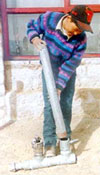
Prototype ram pump in India -- built for one-tenth the commercial price
Assumes no specialised knowledge of hydraulics, needs access only to basic machine tools and a few common engineering materials. Describes how to make a hydraulic ram from mild steel, some nuts and bolts and two rubber disks. Part One contains details of how to make and maintain a small hydraulic ram on a suitable site, Part Two takes a more technical look at ram performances and design considerations and also contains a useful bibliography. Excellent, clear plans for making your own hydraulic ram water pump from standard pipe fittings. Buy online from the Development Bookshop: Manual on the Automatic Hydraulic Ram for Pumping Water
 "Hydraulic Ram Pumps: A guide to ram pump water supply systems" by T.D. Jeffrey, T.H. Thomas, A.V. Smith, P.B. Glover and P.D. Fountain, Practical Action, ISBN 1853391727
"Hydraulic Ram Pumps: A guide to ram pump water supply systems" by T.D. Jeffrey, T.H. Thomas, A.V. Smith, P.B. Glover and P.D. Fountain, Practical Action, ISBN 1853391727
Step-by-step instructions on designing, installing and operating hydraulic ram pumps. Illustrations and diagrams, details of a pump designed for a local manufacture, notes for those developing their own model. Buy online from the Development Bookshop: Hydraulic Ram Pumps: A guide to ram pump water supply systems
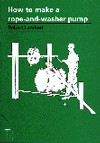 "How to Make a Rope and Washer Pump" by Robert Lambert, 1989, Practical Action, ISBN 1853390224
"How to Make a Rope and Washer Pump" by Robert Lambert, 1989, Practical Action, ISBN 1853390224
How to make a simple, cheap pump which can raise water 18 feet from a stream or well at an output of 1 litre per second. Designed to irrigate small plots. A rope is pulled up through a pipe by means of a pulley wheel -- an old tyre. Fixed to the rope are flexible rubber washers (cut from another tyre) slightly narrower than the pipe; as the washers are pulled up through the pipe water is drawn up and discharged at the top. Rope and washers pass around the pulley wheel and return to the bottom of the pipe. Clever! Buy from Amazon.com: How to Make a Rope and Washer Pump
 "How to Make and Use the Treadle Irrigation Pump" by Carl Bielenberg and Hugh Allen, Practical Action, ISBN 1853393126
"How to Make and Use the Treadle Irrigation Pump" by Carl Bielenberg and Hugh Allen, Practical Action, ISBN 1853393126
The treadle irrigation pump is able to lift up to 7,000 litres of water per hour using the power of the human body, and can be made locally at low cost in small-scale metalworking shops. Its acceptance in Bangladesh where it was first developed in 1984 is extraordinary, with over 500,000 pumps estimated now to be in use. The current design in this manual has evolved from the Bangladesh original into a fully portable pump with both lift and pressure capacity and is especially good for use in permeable soils where water cannot easily be distributed through channels. Buy from Amazon.com: How to Make and Use the Treadle Irrigation Pump

 Water Lifting Devices: A Handbook, Third Edition, Peter Fraenkel and Jeremy Thake, Practical Action, ISBN 9781853395383
Water Lifting Devices: A Handbook, Third Edition, Peter Fraenkel and Jeremy Thake, Practical Action, ISBN 9781853395383
Updated and expanded new edition of Water Pumping Devices, long the authority on the subject. Detailed review of the water-lifting technologies available to smallholders for irrigation, along with new information covering drinking water for humans and livestock. Overview of the entire spectrum of pumps and water lifting devices for small-scale applications and a basis for comparing and choosing between them. Comprehensive single source of practical information. Buy from Amazon.com: Water Lifting Devices: A Handbook
Appropriate technology
Appropriate technology resources
- Agriculture resources
- Wood resources
Blacksmithing
Wood fires that fit
Houses that fit
Water-powered water pumps
Journey to Forever and AT
- Chinese watering cans
- Handmade Projects watering can plans
- Hoe for victory!
- Billhooks and sickles
A better rat trap
- Rats and owls
- Chinese rat trap
- How to make a Chinese rat trap
- Bucket rat trap
Appropriate technology subjects